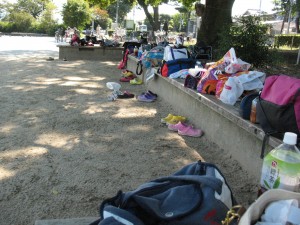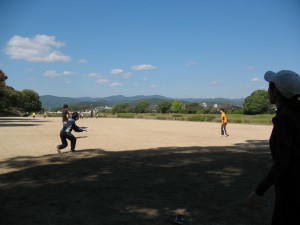Aelita Parker
At salsa, aside from the dancing part, which is consistently enjoyable and has quickly become what I look forward to most on my Friday’s, I’ve gotten such an incredible opportunity to observe an entirely different side of Japan and Japanese. Here there’s no keigo, no bowing, and no real boundaries between sexes. Sometimes I’ll see two women dancing together or two men, and when I see a man and woman dancing it’s a completely different world of interaction. Even when people don’t know each other there’s an immediate familiarity and comfort that you can see in everyone’s complete lack of abashment. It almost feels like a different country in the drastic differences. My understanding of Japanese male female relationships (in a complete simplification) was one where the women sit at different tables then the men when there’s a gathering, where the woman cooks and washes dishes (for the most part), and when you meet someone new you do so with a bow and 「はじめまして」. Not to say that I see no love or joking between couples, but the inequality almost feels built in many times, especially with older adults. Café Rumbita however, has given me such a completely different view, one that expands my view not only of this group of individuals, but also of Japanese and Japanese society in general.
I think in our human need to define and explain, to make sense of people and situations, many think of Japanese and Japan in very narrow terms. We associate collectivism with a lack of uniqueness or personality, and while I didn’t need Salsa to tell me that’s a false and unfair label to place on a whole nation, Salsa gives me proof of that untruth every week. Because the stereotype of Japanese adults is one that can be hard to break, I’m so glad I’ve been in so many situations that completely contrast my previously conceived notions. Here there’s no hierarchy, just lots of spinning and Latin music.
Normally when I meet adults in Japan I get really nervous, trying to review all of the keigo I know in my head before I’m forced to say it. What I’ve noticed here though is that even with people I’m seeing or meeting with the same time, the interactions are much freer and more natural. Sometimes I dance with friends from DESA and we joke in Japanese and spin around with no attention paid to form, and other times I dance with 45 year old men who’ve taken their share of classes. No matter who it is though I don’t think I or they feel any apprehension, or think twice before asking to dance. It’s interesting that something you might peg as being outside of most people’s comfort zones, is the most comfortable place I’ve found myself in Japan, and I think other regulars would agree with me.
Because the context that we see adults in (even in America) you generally have to know someone on a pretty intimate basis to really get below the surface, to see more than a house wife or a salary man. Again I’ve gotten to see thoughts and motivations behind certain decisions from family and my host family in japan, gotten opinions on topics ranging from teenage pregnancy to testing in high schools, but for the first time I was able to see the completely carefree, the completely honest side of adults here. One of my favorite regulars is one of the most proactive and brave women I’ve seen, and it makes me wonder if she carries the same attitude with her back home. Is she as demanding, as enveloped in her life outside as she is in salsa? I see Japanese men dancing the Cuban “sexy” style, men in suits with such grace and precision that I can’t believe they’re not doing this professionally.
The other weekend I spoke to a woman who’s maybe in her forty’s for 20 minutes about the differences between LA, New York, and Cuban styles, after which she taught me a few new steps and we danced the marchata. An interaction I never would have believed would happen in Japan if I had not come here. I’m shy as well, so this has been such a great opportunity for me to break out of my shell and completely unfurl.
When I went this past Friday, for the first time, I danced with the teacher Masanori. Maybe an irrelevant side note but that moment was added to my top three favorite moments of my trip so far, and added to my already inexpressible love of salsa and café Rumbita.


